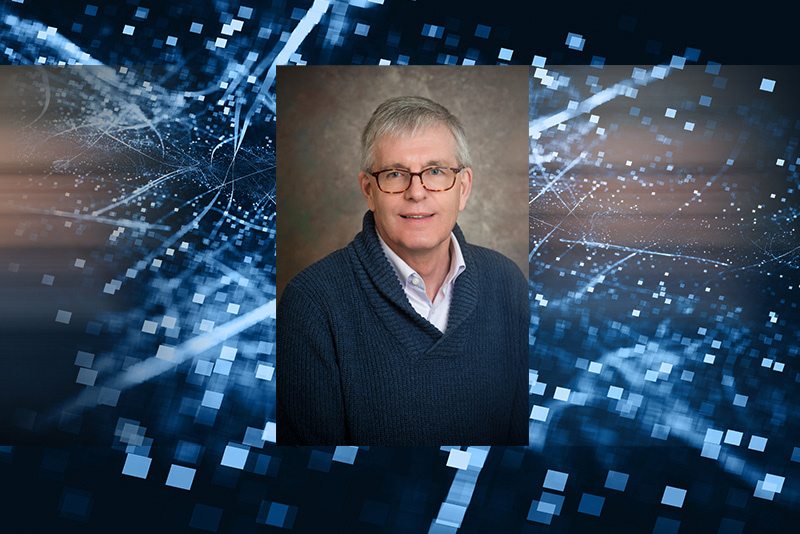


Harnessing artificial intelligence for the masses
Photo by Ariel Ramirez September 16, 2021
UD Prof. Rudolf Eigenmann is part of $20 million NSF cyberinfrastructure project
It takes real intelligence and plenty of collaborative muscle to harness the potential of artificial intelligence. Most of us can barely grasp the concept of human-made machines learning how to process and analyze enormous amounts of data, then using that mass of information to understand things at new scales and in new combinations, delivering useful insights that our brains would never be able to produce on their own.
Now University of Delaware Prof. Rudolf Eigenmann, interim chair of the Department of Computer and Information Sciences and professor of electrical and computer engineering, is playing a critical role in a new $20 million National Science Foundation-supported project designed to expand access to artificial intelligence.
AI for the masses, you might call it.
The project, called the NSF AI Institute for Intelligent Cyberinfrastructure with Computational Learning in the Environment (ICICLE), is one of 11 new National Artificial Intelligence Research Institutes the NSF announced recently. It is the second year of such investment by NSF. This $220 million in support follows the $140 million that created the first seven AI institutes in 2020. The overall effort now includes partners in 38 states.
“These institutes are hubs for academia, industry and government to accelerate discovery and innovation in AI,” NSF Director Sethuraman Panchanathan said when the new institutes were announced. “They lead to new capabilities that improve our lives from medicine to entertainment to transportation and cybersecurity, while growing the economy and maintaining global competitiveness.”
The goal is to provide this power tool — artificial intelligence — to researchers and many others who would not otherwise have access to the speed, efficiency, insight and accuracy it can provide. NSF also sees the potential to help older adults lead more independent lives and improve the quality of their care; transform AI into a more accessible “plug-and-play” technology; create solutions to improve agriculture and food supply chains; enhance adult online learning by introducing AI as a foundational element; and support underrepresented students from elementary school to postdoctoral levels to improve equity and representation in AI research.
The work is led by NSF in partnership with the U.S. Department of Agriculture National Institute of Food and Agriculture (USDA-NIFA), U.S. Department of Homeland Security (DHS), Google, Amazon, Intel and Accenture.
The institute Eigenmann is part of is led by Ohio State University. His focus will be on cyberinfrastructure, which includes hardware from supercomputers to tiny data-collection devices, the software that drives that hardware, the networks that carry the data and the applications that produce and consume that data — the physics problems, the biology problems, the chemistry problems, for example.
Eigenmann knows his way around all these things. He was an NSF program manager in the Office of Advanced Cyberinfrastructure before joining UD’s faculty in 2017.
“Data is a big word and there is such an enormous amount of data,” he said. “We need to be careful in managing and harnessing the data. That is another big question or element of cyberinfrastructure.”
The principal investigator is Dhabaleswar K. (DK) Panda, professor of computer science and engineering at Ohio State. Eigenmann is one of 46 researchers participating from 13 universities.
“Industry partners will play an important role in what we do for various reasons,” Eigenmann said. “What academics can do is dwarfed by what industry does, so we have to know what industry is doing and how we can synergize.”’
Developing AI capabilities across all colleges is a growing thrust at UD, Eigenmann said. Several students will be working on this new project, he said, and he anticipates involvement by other colleagues.
“When I arrived at UD, we started to build a faculty network in high-performance computing, with colleagues in all colleges involved,” he said. “Colleagues from all over the University participate in the Data Science Institute. It will take more, but this is a very good starting point.”
The ICICLE team will build and prove its system around three application domains: Smart Foodsheds (food produced locally), Digital Agriculture, and Animal Ecology.
In addition to UD and Ohio State, collaborators include: the Ohio Supercomputing Center, Case Western Reserve University, Iowa State University, Indiana University, the University of Wisconsin at Madison, the University of Texas at Austin/Texas Advanced Supercomputing Center, the University of Utah, UC San Diego/San Diego Supercomputing Center, UC Davis, Rensselaer Polytechnic Institute and IC-FOODS.
Learn more about the NSF AI Institutes and artificial intelligence research by visiting nsf.gov.
About the researcher
Rudolf Eigenmann is interim chair of the University of Delaware’s Department of Computer and Information Sciences and professor of Electrical and Computer Engineering. He earned his master’s degree and his doctorate in electrical engineering at ETH in Zurich, Switzerland. He is an IEEE Fellow. Before joining the UD faculty in 2017, he was a professor at Purdue University and program director of the National Science Foundation’s Office of Advanced Cyberinfrastructure.
Contact Us
Have a UDaily story idea?
Contact us at ocm@udel.edu
Members of the press
Contact us at 302-831-NEWS or visit the Media Relations website

